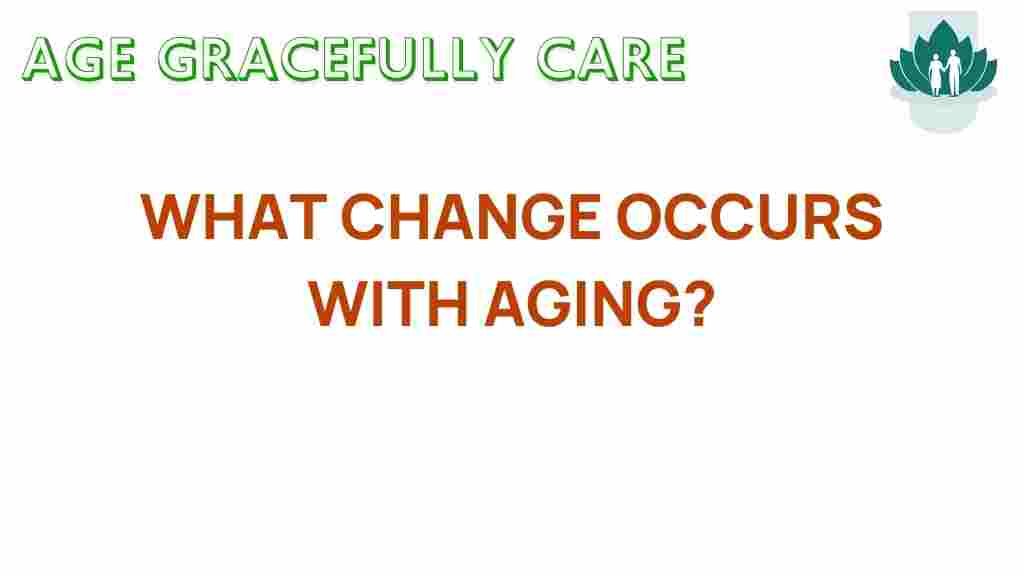Unraveling the Mysteries of Aging: What Changes Can We Expect?
Aging is a natural process that every individual experiences, marked by various biological changes that can impact our health, wellness, and longevity. As we age, understanding these changes is crucial for maintaining resilience and physical fitness, as well as mitigating cognitive decline. This comprehensive guide seeks to unravel the mysteries of aging, highlighting what changes we can expect and how lifestyle choices play a significant role in our overall well-being.
The Biological Changes of Aging
Biological changes during aging can be both subtle and profound. These changes affect our cells, tissues, and organs, leading to varying impacts on our health. Here are some key biological changes associated with aging:
- Cellular Senescence: As we age, our cells begin to lose their ability to divide and function properly. This can lead to tissue degeneration and increased inflammation.
- Decreased Hormone Levels: Hormonal changes, such as reduced levels of estrogen and testosterone, can affect metabolism, mood, and energy levels.
- Changes in Muscle Mass: Sarcopenia, or the loss of muscle mass, is common in older adults, impacting physical fitness and strength.
- Bone Density Loss: Aging leads to decreased bone density, increasing the risk of fractures and osteoporosis.
- Neurological Changes: The brain undergoes changes that can affect cognitive function, contributing to cognitive decline.
Health Implications of Aging
As we navigate the aging process, it’s essential to recognize the health implications of these biological changes. Here are some common health concerns associated with aging:
- Chronic Diseases: Older adults are at a higher risk for chronic diseases such as heart disease, diabetes, and arthritis.
- Immunity Decline: The immune system weakens with age, making individuals more susceptible to infections.
- Cognitive Decline: Memory loss, decreased problem-solving abilities, and slower processing speeds can occur.
- Physical Limitations: Reduced mobility and endurance can affect daily activities and quality of life.
Enhancing Longevity Through Lifestyle Choices
While aging is inevitable, the choices we make can significantly influence our longevity and overall health. Here are some lifestyle changes that can enhance wellness and resilience:
- Balanced Nutrition: Eating a diet rich in fruits, vegetables, whole grains, and lean proteins can support health. Antioxidants found in these foods help combat oxidative stress.
- Regular Physical Activity: Engaging in both aerobic and strength-training exercises can help maintain muscle mass and improve cardiovascular health.
- Quality Sleep: Prioritizing sleep is essential for cognitive function, mood regulation, and overall health.
- Mental Stimulation: Activities that challenge the brain, such as puzzles or learning new skills, can help preserve cognitive function.
- Social Connections: Maintaining relationships and engaging in social activities can boost mental health and resilience.
Step-by-Step Process for Healthy Aging
To age gracefully and healthily, consider following this step-by-step process:
- Assess Your Current Health: Schedule regular check-ups with your healthcare provider to monitor your health status.
- Create a Balanced Diet Plan: Consult a nutritionist to design a diet that meets your nutritional needs.
- Establish a Fitness Routine: Aim for at least 150 minutes of moderate aerobic activity each week, combined with strength training exercises.
- Prioritize Mental Health: Incorporate mindfulness practices such as meditation or yoga into your daily routine.
- Stay Engaged Socially: Join clubs, attend community events, or volunteer to interact with others.
Troubleshooting Common Issues
As you implement these lifestyle changes, you may encounter challenges. Here are some troubleshooting tips:
- Lack of Motivation: Set small, achievable goals and celebrate your progress to stay motivated.
- Difficulty Maintaining a Healthy Diet: Meal prep in advance and keep healthy snacks on hand to avoid unhealthy choices.
- Injury or Pain During Exercise: Consult a fitness professional to modify your routine to suit your physical capabilities.
- Feeling Isolated: Reach out to family or friends, or consider joining online communities to connect with others.
Cognitive Health and Aging
Cognitive decline is one of the most concerning aspects of aging for many individuals. However, several strategies can help mitigate these effects:
- Engage in Lifelong Learning: Pursue new hobbies, take classes, or learn a new language to keep your mind active.
- Practice Brain-Healthy Habits: Ensure you are getting adequate sleep, staying hydrated, and managing stress effectively.
- Limit Alcohol Consumption: Excessive drinking can accelerate cognitive decline; moderation is key.
- Stay Physically Active: Regular physical exercise has been shown to have a positive impact on brain health.
Physical Fitness as a Cornerstone of Aging Well
Physical fitness is essential for maintaining health and resilience as we age. Here are some forms of exercise that can be beneficial:
- Aerobic Exercises: Activities like walking, swimming, and cycling improve cardiovascular health.
- Strength Training: Incorporating weights or resistance bands helps counteract muscle loss.
- Flexibility and Balance Exercises: Yoga and tai chi can enhance flexibility and reduce the risk of falls.
By making physical fitness a priority, individuals can improve their overall quality of life and longevity.
Conclusion: Embracing the Aging Journey
Aging is a complex process filled with changes that can significantly impact our health and well-being. However, by understanding the biological changes associated with aging and making informed lifestyle choices, we can enhance our longevity and resilience. Embracing a holistic approach to wellness that includes a balanced diet, regular physical activity, mental stimulation, and strong social connections can make a profound difference in our aging journey.
For more information on aging and health, consider visiting National Institute on Aging for resources and research. Remember, while we cannot stop the aging process, we can certainly influence how we experience it.
To learn more about maintaining a healthy lifestyle, check out our other articles on wellness and fitness tips.
This article is in the category Health and created by AgeGracefullyCare Team
